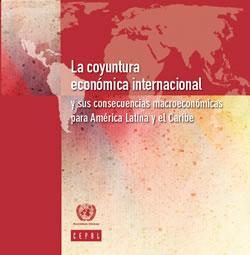(4 October 2013) The region's countries will have to adopt a series of measures to better overcome high financial volatility and sluggish global trade. According to a new ECLAC report analysing the international situation during the first half of 2013 and its impact on the region, these measures include social covenants for investment.
The study on The current international context and its macroeconomic repercussions for LatinAmerica and the Caribbean was launched today in Santiago, Chile.
In the document, ECLAC calls on countries to drive forward social covenants for investment based on socio-political agreements involving the State, the private sector and social organizations, so that institutional arrangements and short- and long-term policies can make resources available for diversifying the production structure and boosting economic growth.
The study explains that, while international trade has stabilized somewhat to give a potential positive outlook in recent months, there is still no clear sign of significantly buoyant growth in world GDP or trade.
According to the report, overcoming this time of sluggish trade and international financial volatility requires the region's countries to adopt short- and long-term policies.
In the short term, international reserves should be used to boost confidence in the system and prevent sudden outflows of capital, as well as moderating the more dramatic exchange-rate fluctuations to avoid their potential effects on inflation and expectations of currency devaluation.
For the medium and long term, ECLAC advises accepting a gradual change towards increasing depreciation of the region's currencies (with fluctuations observed in recent months). This would regain some of the competitiveness lost in tradable goods sectors of Latin American and Caribbean economies. That would in turn encourage a transition towards growth more firmly based on investment and exports amidst greater equality (unlike now when expansion is based mainly on consumption).
In its analysis of the international situation, ECLAC identifies two main trends related to fiscal and monetary policies adopted by countries most affected by the global financial crisis that struck in 2008-2009.
In terms of fiscal policies, these were mainly used to reduce fiscal gaps in Europe, Unite States and Japan. Monetary stimulus came mainly from the United States Federal Reserve, which promoted the purchase of financial and non-financial assets from the private sector in exchange for liquidity (with a view to facilitating a way out of recession).
According to ECLAC, these policies had varying effects in Latin America and the Caribbean. On the one hand, exports shrank, prices of raw materials sold by the region fell and tourism and remittances decreased - partly due to contractionary fiscal policies. On the other hand, greater international liquidity pushed up capital inflows to emerging markets, which increased currency appreciation in those countries. This trend was temporarily halted by the announcement of a possible end to monetary stimulus measures in the United States.
In the first half of 2013, Latin America and the Caribbean grew by almost 2.5% compared with the same period of 2012. While growth did pick up in the second quarter of 2013, average growth in the second half of the year in several countries was lower than that observed throughout 2012 (including some economies in Central America, Mexico, Chile and Peru).
South American economies that export agricultural products have a higher growth rate than in 2012.
See also:
Any queries should be sent to the ECLAC Public Information and Web Services Section.
E-mail: prensa@cepal.org; Telephone: (56 2) 2210 2040.
